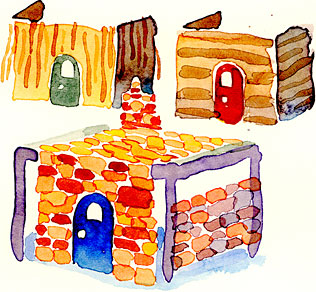Three Little Pigs, Part II: Play Acting
Lets kids practice
their acting.
Objectives
Children ages 5-6 can act out a story Lang. IIIB
and ages 2 ½-3 can participate in storytelling with words and phrases Lang. IIC
All of the children can participate in role play involving specific
situations Cog. IV A
manipulates blocks and building material, and onlooker behavior - child watches
play and joins in for a few minutes. SE IV

Materials
Book "The Three
Little Pigs"; Props: straw (or a reasonable facsimile); sticks
(Branches or rhythm sticks); bricks (wooden, plastic or Styrofoam blocks);
moveable tables and chairs; large blocks; prepared pig and wolf costumes.
Procedures
1. Gather kids on floor wearing pig costumes. Review story,
describe action and repeat dialogue as a group. Establish layout of the stage
-- areas for straw, stick and brick houses and forest hideout for wolves.
2. Move materials to building sites. Children select their roles and build
houses. Brick house should be constructed from a sturdy table that will hold
the wolves when they attempt to climb down the chimney. Straw and stick houses
should be flimsy and easy to knock down without causing injury to any of the
children inside. Large cardboard boxes work well.
3. When houses are finished, piggies hide inside while wolves wait in their
forest hideout. Introduce play and players.
4. Narrate the story, beginning with emergence of hungry wolves from forest and
their discovery of the piggies' straw house. Applause and cheers for all
participants.
5. Rebuild houses and repeat play.
Note: Several children can be wolves or sseveral can be pig(s) in brick house if that's
what they want to be. Be flexible..... it might be the Story of the Six Little Pigs. Extension: As performers become famiiar with the play and story, expand the cast and plot to include the Mother (or Father) Pig, and the straw, stick, and brick sellers.
|